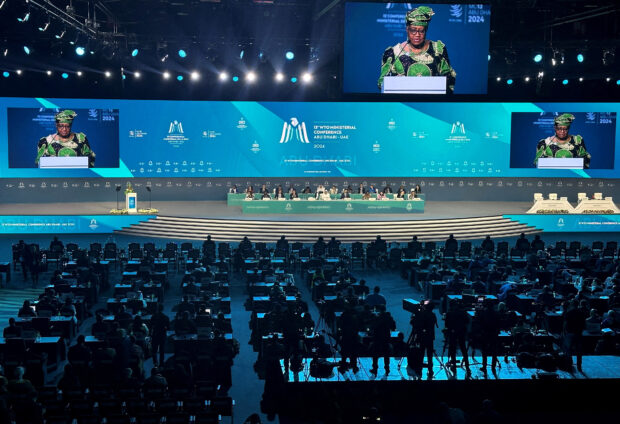WTO talks deadline extended again with talks deadlocked

Director-General of the World Trade Organization Ngozi Okonjo-Iweala speaks during the opening ceremony of the WTO ministerial meeting in Abu Dhabi, United Arab Emirates, February 26, 2024. REUTERS/Abdel Hadi Ramahi/File Photo
ABU DHABI — Negotiations at the World Trade Organization ministerial meeting in Abu Dhabi on Thursday were extended for another day, with the WTO saying the closing session had been delayed, and no immediate sign of breakthroughs in talks to set new global commerce rules.
The biennial conference is seeking deals on ending fishing subsidies and extending a moratorium on digital trade tariffs – a move that India and South Africa oppose.
READ: US trade chief rules out WTO dispute deal this week
Some negotiations carried on past midnight as officials sought to hammer out agreements on a cross section of changes to trade rules. WTO spokesperson Ismaila Dieng said ministers were working hard and making real progress. “However the negotiations are difficult because of interlinkages between the areas under negotiation,” he said, adding ministers will regroup on Friday morning to review the latest revisions.
The scheduled announcement of a final agreement after four days of intergovernmental talks between the WTO’s 164 members was pushed back for a fifth day until 2 p.m. (1000 GMT) on Friday in the Gulf state. This followed an earlier four-hour delay.
Some participants were doubtful a deal would be reached by then, telling Reuters that serious differences remained on a range of issues meant to address global trade, although others said the mood had improved slightly during the day.
READ: WTO conference: the main issues
U.S. Trade Representative Katherine Tai told Reuters that breakthroughs were still possible, but “complex trade-offs” would be needed even for less-difficult topics such as curbing fishing subsidies.
If some or all of the talks aimed at fixing global commerce rules do collapse, fragmentation among the BRICS bloc of emerging economies “will have contributed,” she told Reuters.
New Zealand’s trade minister Todd McClay said it was a good sign that delegates were still trying to thrash out issues.
“There is a desire for an outcome but there are delegations on both sides of issues saying: the only way we can have an outcome is if our concerns are addressed,” he told Reuters. However, McClay, who is the facilitator on talks to extend a 25-year moratorium on digital tariffs, said there had been no movement yet on overcoming a deadlock.
Digital trade impasse
India’s trade minister said it was a shame some nations were blocking agreements, but he gave little sign that New Delhi would drop its own opposition to extending a waiver on digital tariffs.
“Of course we feel sad that some countries are still obstructing significant outcomes that could have helped less developed countries and developing countries gain confidence in the working of WTO,” Piyush Goyal told reporters.
Still, he voiced optimism that such outcomes could be achieved in the talks.
Tai said the impasse on the extending the digital trade moratorium could be “unlocked … if agriculture is unlocked,” but noted that the negotiations were “hard.”
Fisheries draft deal faces opposition
A grouping of Pacific islands, including Papua New Guinea and the Solomon Islands, were also opposing a draft deal on changes to fisheries subsidies, with Fiji’s deputy prime minister telling Reuters it did not go far enough.
“We would like the large subsidising countries to put a cap on the current level of subsidies,” Manoa Seru Kamikamica said.
A trade delegate from a developed country dismissed this prospect. A key meeting between Pacific Island countries and major subsidising countries like the EU, China and Japan is planning in the very early hours of Friday morning, trade sources said.
India’s Goyal did not name the countries that he said were blocking results at the talks. But he said his top priority was fixing the WTO’s dispute system, adding he had raised the lack of progress with USTR’s Tai in a Wednesday meeting.
“The first and highest priority is to get the Appellate Body of the dispute resolution mechanism in place because without that all the decisions we are taking cannot be adjudicated upon,” he said.
The WTO’s top appeals court has been hamstrung for four years due to U.S. opposition to judge appointments and remains out of service. Tai already ruled out an agreement on WTO dispute settlement appeals reform this week, but said negotiations were showing progress.